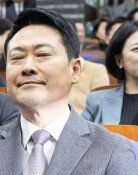Lunch at a Chinese Restaurant Hosted by North Korea
Lunch at a Chinese Restaurant Hosted by North Korea
Posted March. 10, 2007 07:45,
820 2nd Avenue, New York City. This is the address of the permanent mission of North Korea in the United Nations, the only North Korean diplomatic arena in the U.S. It is a four-minute walk from the UN headquarters and a two-minute walk from the permanent mission of South Korea to the U.N. It is located on the 13th floor of the Diplomatic Center.
About 10 North Korean diplomats including North Korean Ambassador to the U.N. Pak Gil Yon are working in this place. When you look at the list of member states of the U.N., youll find names like Mrs. Pak and Mrs. Kim right below the list of North Korean diplomats. These are diplomats wives who help their husbands at the office by answering phones.
They live in an apartment on Roosevelt Island located on the opposite side of the U.N. headquarters. Many diplomats from poor countries such as North Korea and African nations live there because the rents are relatively inexpensive compared to those of Manhattan.
The diplomats except for Ambassador Park go to work together via minivan. Deputy Ambassador Kim Chang Guk is in charge of U.N.-related affairs and Minister of Political Affairs Kim Myong Gil handles U.S.-related issues. North Korean diplomats have a good command of English. Minister Kims English is fluent enough to communicate with reporters in English. Some young diplomats speak French as well.
However, during North Korea-U.S. talks, Choi Son Hee, a fellow researcher of North Korean Foreign Ministry, interpreted for the North Korean delegation headed by Vice Foreign Minister Kim Kye Kwan. She is not only an interpreter but also a diplomat. Choi, who visited the U.S. for the third time, drew attention as an excellent interpreter.
North Korean diplomats are required to get permission from the State Department when they travel beyond the 30-mile limit from the Columbus Circle in Manhattan. When Ambassador Park has to go to Washington, he has to get permission.
Recently, Harvard University was going to invite Mr. Park to hold a forum but failed because the State Department did not issue permission. So the host tried to change the location to Columbia University, which is located within the 30-mile limit. .
South Korean diplomats contacting North Korean diplomats directly or indirectly say they are not financially abundant. It is said that ethnic Koreans who are friendly to North Korea help the North Korean representatives in one way or another. The North Koreans sometimes visit a Korean restaurant on the 32nd Street but not often. Some people say they saw them eat at a delicatessen.
North Koreans often use a Chinese restaurant just beside the North Korean mission when they have an official meeting. A lunch set menu costs about 40 dollars per person and the restaurant offers delicious food so that many South Korean diplomats visit the place. North Korea invited the U.S. delegation to the restaurant for lunch as a return courtesy.
The Korea Society sponsored a large sum of money for the 7-day stay of the North Korean delegation consisting of 7 members, and Stanford University`s North Korea expert group paid for the money needed for the stay in San Francisco. The National Committee on American Foreign Policy also chipped in. Non-profit organizations in the U.S. sponsored the delegation from hotels, restaurants and musicals, as well as round-trip flights from Beijing to San Francisco and New York.
The Korea Society, an organization founded by Korea experts dedicated to the promotion of greater awareness, understanding and cooperation between the people of the United States and Korea, says funding for its programs is derived from contributions, endowments, membership dues and program fees on its website. Many U.S. branch chiefs of Korean conglomerates such as Hyosung and Posco work in the board of directors, and many U.S. companies trading with South Korea sponsor the organization. The South Korean government is supporting it indirectly through the Korea Foundation. A 2004 document shows that the foundation gave 1.1 million dollars to the Korea Society.
kong@donga.com







